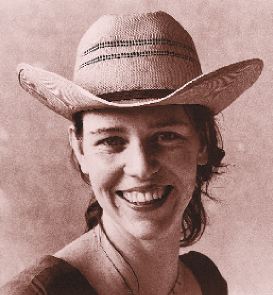O Sister!
Gillian Welch (B.A. art, Porter College '90) follows up two successful albums with a popular movie soundtrack.
 Photo: David Gahr |
Hollywood glamour was nowhere to be found when singer Gillian Welch stepped before the camera for her cameo role in the movie O Brother, Where Art Thou? Just getting there had been hard enough: On tour in Manhattan, she played until about 2 in the morning, boarded a plane for Mississippi at 6 a.m., then was driven to sweltering Yazoo City where the film was being shot. "I told them I was going to look terrible, and they said, 'That's good!' " The person doing her makeup had a similar attitude. "All the woman did was darken the circles under my eyes. That's all I got for my big-screen debut." Welch, who played a major role in the 2000 movie's often-haunting soundtrack, had a minor screen part, portraying a rural woman asking for a record by "The Soggy Bottom Boys," the film's protagonists. "My little cameo in the movie was a first–and probably last– for me." |
Welch's unique sound, a blending of various musical influences, especially bluegrass and traditional country music, made her a natural for O Brother. The Coen Brothers' movie was set in the 1930s South and billed as a retelling of Homer's Odyssey. In addition to performing on the soundtrack, she served as the film's associate music producer. (T-Bone Burnett, who produced Welch's first two albums and is also known for his work with Los Lobos and Counting Crows, was the movie's music producer.)
The old-fashioned sound-- no recording equipment made after 1948 was used--struck a chord with a public more accustomed to pop-country music, propelling the soundtrack to the top of the country charts. "It's just completely surpassed any expectations that anybody had," said Welch.
Welch's career as a singer-musician has been an odyssey of sorts. The artist who sang the moonshiner's lament, "Tear My Stillhouse Down," in her 1996 debut album, Revival, grew up in Los Angeles in a show-business family. (Her parents worked on television's Carol Burnett Show.) She learned to play the guitar, drums, piano, and ukulele, and listened to everything from her parents' hootenanny music to James Taylor and the Beatles.
It was during her time at UCSC, though, that she was first drawn to the distinctive sound of bluegrass music. After trying her hand at performing in the Bay Area, Welch attended the Berklee College of Music in Boston, where she met David Rawlings, her singing and songwriting partner ever since.
Now living in Nashville, she has released a second album, Hell Among the Yearlings, and is working on her third, Time (The Revelator), due out July 31.
Welch's style of music, as she puts it, "sort of defies classification." While she has one foot in the bluegrass world, she also gets airplay on college and alternative radio. "Our stuff turns up in funny places," she said, recalling that one punk-rock station plays her "blood-and-guts gospel songs."
Country music radio didn't quite know what to do with the O Brother, Where Art Thou? soundtrack. "When they first released the album, there was no talk about anybody playing it on country music stations," Welch said. Then the soundtrack became Billboard's top country music album, but country stations still weren't playing it. "It made them look bad, so they eventually started playing it."
Welch doesn't consider herself part of country music's modern mainstream, but she's optimistic that the soundtrack's success will spawn wider interest in traditional and acoustic music. The veteran musicians who worked on the soundtrack "are getting calls left and right," she said. "It's been such a great thing for the music community I'm involved with. It's already having an influence on the next batch of albums coming out of this town."
"This town," Nashville, is where Welch feels at home these days. "From Santa Cruz to Nashville was not very difficult for me. I have such respect for so much of the music which has been made here," she says. While working on her latest album, Welch has been steeped in Nashville's tradition, recording in the restored RCA Studio B, where the likes of Elvis Presley, Roy Orbison, and the Everly Brothers once made musical history.
While Welch has no plans for more acting, movie soundtracks are another story. Her music has been part of many films, including Hope Floats and Ulee's Gold, and she was told early in her career to expect a lot of movie work. "People have always thought our songs were cinematic," she says.
Welch recently collaborated with Willie Nelson on "I'm Not Afraid to Die," which she wrote with David Rawlings, for the independent film The Journeymen. "I'm a big fan of Willie's, so that was a big deal." The song is typical of her style: gritty, and sometimes dealing with death, but not gloomy:
Forget my sins up on the wind,
My hobo soul will ride,
I'm not afraid to die.
I'm not afraid to die.
–Louise Gilmore Donahue